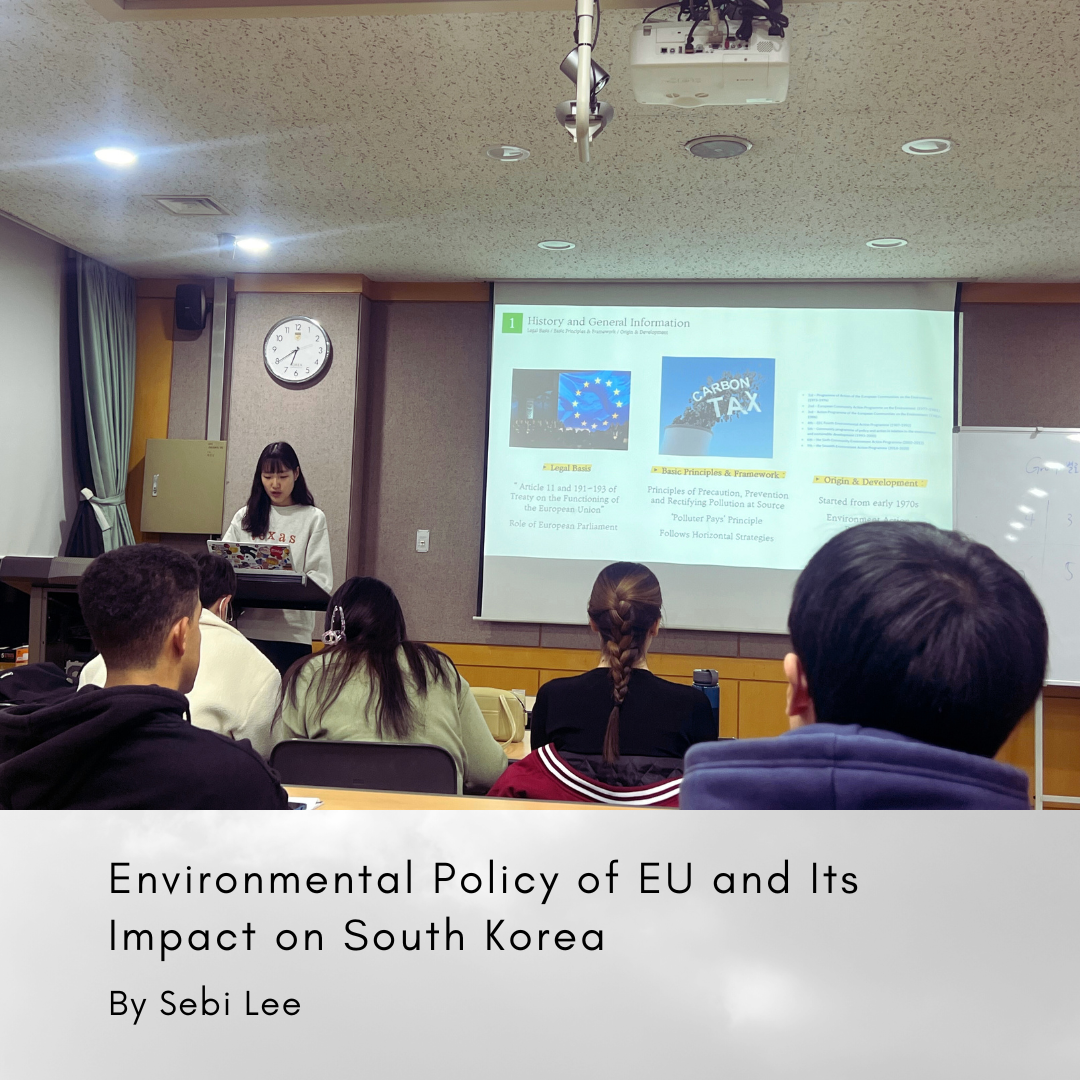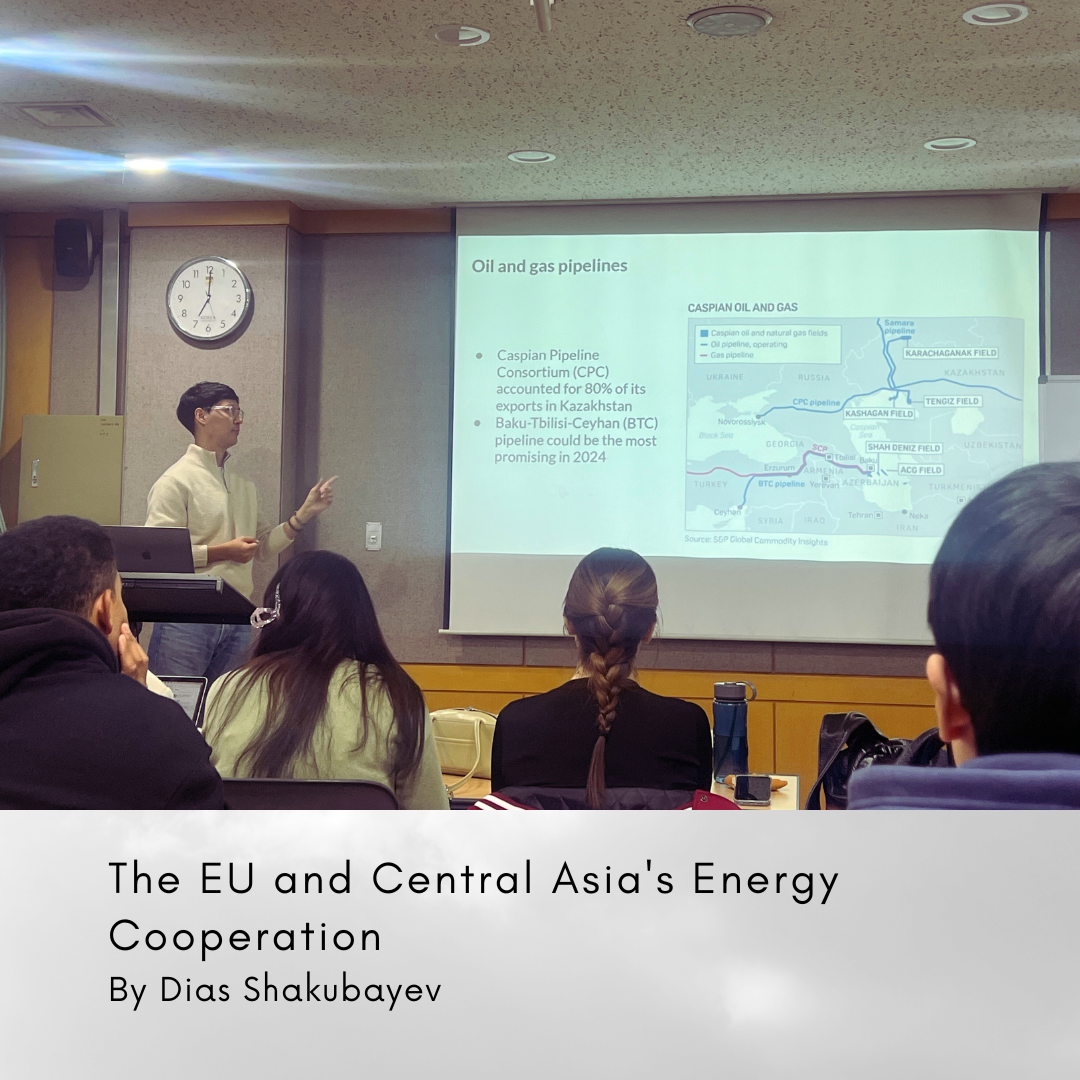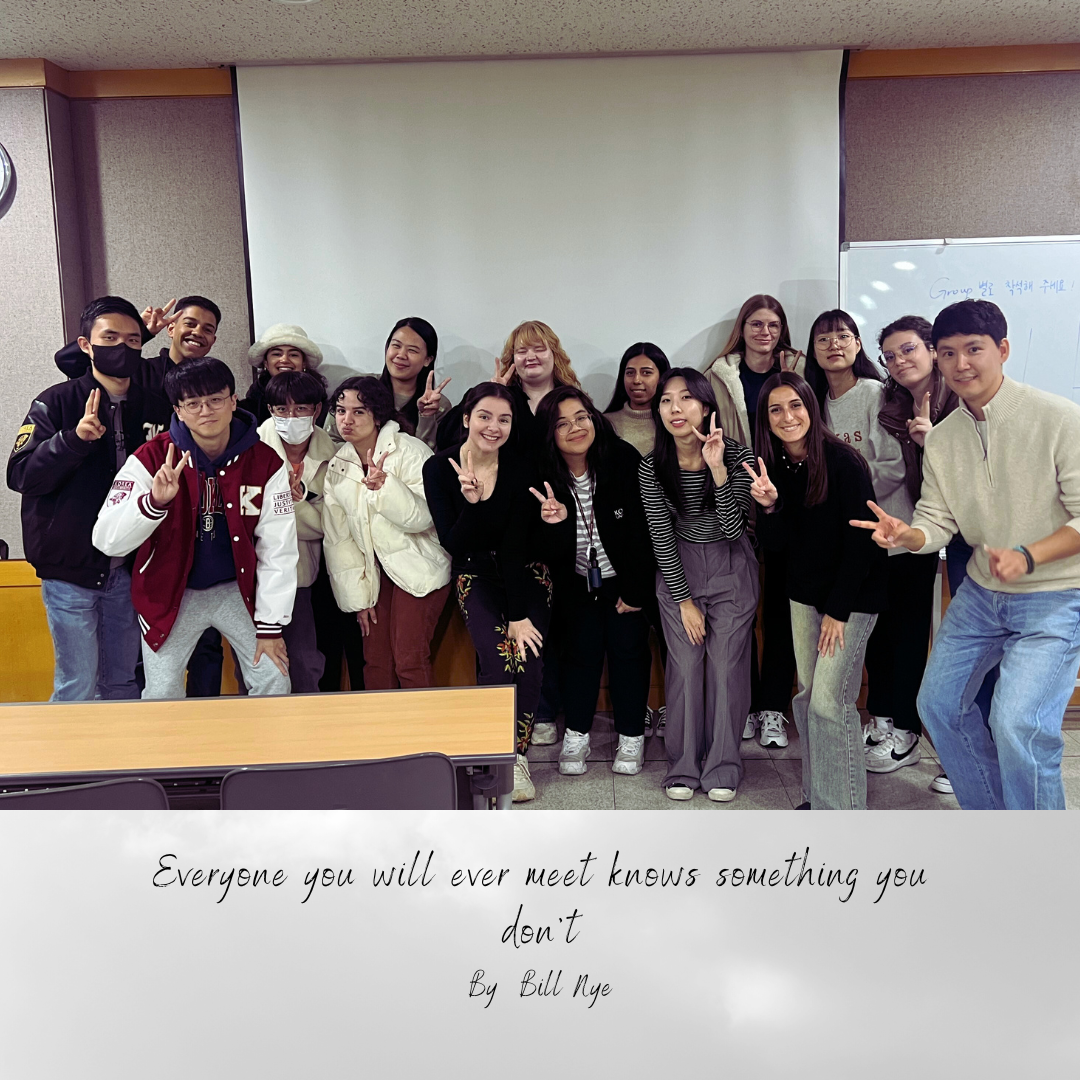2023-2 EU Society 5th Session (Nov 7, 2023)
페이지 정보

본문
The Fifth Session of the EU Society began swiftly, with a presentation titled “The Environmental Policy of the EU and Its Impact on South Korea” by Sebi Lee. During the presentation, Sebi Lee delved into several crucial aspects of the EU’s environmental policy, with a primary focus on the European Green Deal, its historical context, and how it could affect South Korea.

Sebi Lee, began her presentation by emphasizing the significance of the European Green Deal, a transformative growth strategy introduced on December 11, 2019. This initiative aims to reshape the EU into a modern, resource-efficient, and competitive economy, with a bold target of reducing emissions by at least 55% by 2030. Ursula von der Leyen, the head of the EU Commission, aptly referred to this endeavor as “Europe’s man on the moon moment.” In addition to the European Green Deal, participating students could learn more about the EU’s environmental policy, and the significance of the historical development of the Environment Action Programme, which was initiated in the 1970s and operates in 5-10-year cycles. The fundamental principle of “polluter pays” and the EU’s alignment with international rules, especially the UN Sustainable Development Goals, were underscored. The presentation also shed light on the mechanisms underpinning the EU’s environmental policy. These include IMPEL, the European Environment Agency (EEA), the use of criminal sanctions for severe environmental offenses, and European Earth Observation as pivotal monitoring tools. And although the European Green Deal has many positive sides to it, Sebi’s presentation didn’t shy away from addressing criticism, especially concerning the ambitious nature of the European Green Deal. Notably, the proposal to have all vehicles with zero emissions by 2035 raised eyebrows of many european officials, with some labeling it as “European Trumpism” and questioning its feasibility, particularly in light of recent geopolitical developments. Last, but not the least, the presentation touched upon the exploration of the potential impact of the EU’s environmental policy on South Korea, drawing attention to its significance for South Korea’s exports, recycling rate, and the restriction of hazardous substances directives. The introduction of the Green Tax and forthcoming environmental regulation.
The following discussion was started by two questions: “How should the world or a country react to the environmental policy of the EU?” and “What is the most urgent issue/crisis when it comes to sustainability?” Many students shared their concerns, particularly regarding the ambitious nature of the EU’s goals and expressed skepticism about achieving these goals by 2050. They anticipated a challenging, up-and-down progress as a more likely scenario. Additionally, there was apprehension about the potential impact of the EU’s policies on the trading partners of the EU, particularly the economic consequences of the Green Deal. Students noted that these policies could strain international trade relations.

Second presentation by Dias Shakubayev - “The EU-Central Asia Energy Cooperation” was started on a positive note by Dias with the statement “People have many misconceptions about Central Asia, but always note - Borat is not from Kazakhstan”. On a more professional note, Dias’s presentation offered a comprehensive view of the energy dynamics between Central Asian oil-producing countries and the European Union, revealing key aspects of energy production, trade, and the prospects for collaboration. Central Asia’s energy production and its relations with the European Union were the main focus of this presentation. Notably, it was highlighted that a substantial 85% of crude oil from Kazakhstan finds its way to EU markets, with only 10% going to China. The principal energy resources in Kazakhstan encompass coal, gas, and oil, and there is a concerted effort to increase exports to the EU. However, there are many challenges these days in these export goals by Kazakhstan due to the wake of the EU’s transition toward green energy initiatives. Many students were surprised to find out that a major importer of crude oil from Kazakhstan was actually - Switzerland. The Baku-Tbilisi-Ceyhan pipeline was mentioned as a potentially crucial energy route. And this came to be due to the rising concerns of Caspian Pipeline Consortium - the main pipeline used up until 2022, and its passage through Russia, given the current geopolitical climate, adding an element of risk to its operation. The next Central Asian country that was discussed was Turkmenistan and its ambitions to double its natural gas production were discussed, with China emerging as a significant importer of Turkmen oil. While the desire to expand to the West and EU markets was evident, infrastructural limitations posed substantial challenges, particularly due to the considerable distance involved. Last, but not the least, Uzbekistan’s significant role in the Central Asian energy landscape was recognized, with the country possessing one-third of all mineral resources in the region. The majority of its energy resources are directed toward China through the Central Asian pipeline. Our EU Society member, Dias, outlined various initiatives and strategies developed between Central Asia and the EU, including the Technical Aid to Commonwealth of Independent States (TACIS) program initiated in 1991 as a response to the EU’s concerns about energy security. The EU Strategy on Central Asia (2007) aimed to enhance regional cooperation, and EU4Energy (2016) highlighted the need for technical assistance due to the region’s resource potential but lack of technology. An update on the EU's strategy for Central Asia in 2019 highlighted new opportunities for a stronger partnership. Finally, the report noted the establishment of a strategic partnership between the EU and Kazakhstan in 2022, focusing on raw materials, batteries, and renewable hydrogen.
The ensuing discussion was initiated by the question: “How long do you think the EU will rely on fossil fuels?” Various perspectives were shared, with several students expressing the view that the EU is likely to depend on fossil fuels for at least another 50 years. They pointed out the extensive use of petroleum in numerous sectors, especially for heavy machinery where electronic alternatives remain inadequate. It was acknowledged that many countries, both within and outside the EU, may face financial constraints that make a rapid transition to green energy unfeasible. The conversation then shifted towards the topic of nuclear energy and renewable energy in the EU. Students engaged in a thoughtful exchange of ideas, with an emphasis on the political dimensions of a country’s decision regarding nuclear energy. It was noted that political considerations often play a significant role in shaping a country’s stance on nuclear energy. Furthermore, the discussion delved into the infrastructure challenges faced by Kazakhstan and who would fund the construction of necessary pipelines to transport their rich natural resources. The complexities of managing such infrastructure projects and the financial commitments required were a subject of interest.

After the two insightful presentations and discussion all of the members were invited to have dinner together.
- 이전글2023-2 EU Society 6th Session (Nov 14, 2023) 23.12.04
- 다음글2023-2 EU Society 4th Session (Oct 31, 2023) 23.12.04
댓글목록
등록된 댓글이 없습니다.










